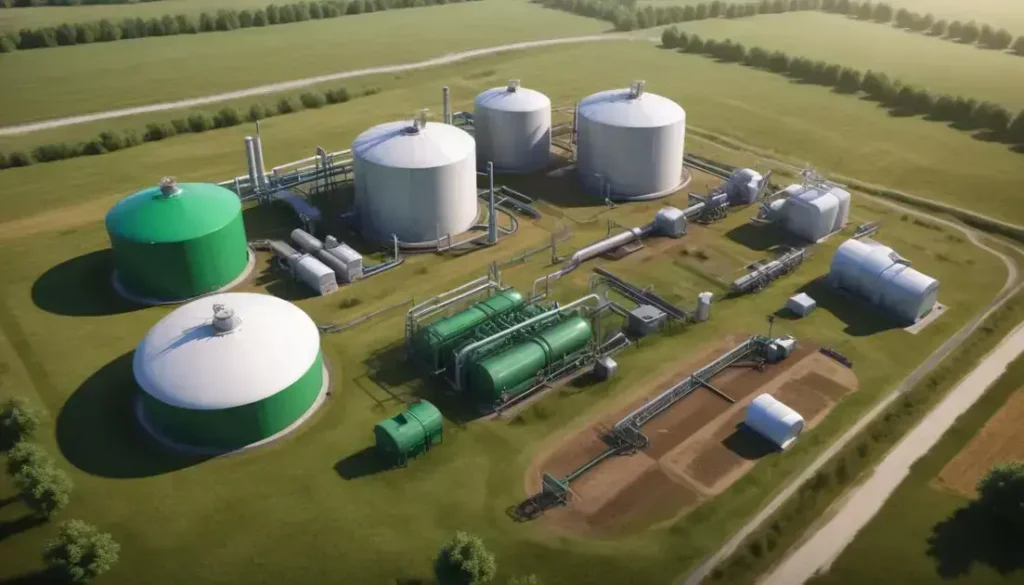The future of supply chain sustainability focuses on integrating eco-friendly practices, embracing technology, and fostering collaboration among businesses to enhance efficiency while reducing environmental impact.
The recent development of Vodafone’s logistics hub is set to transform the supply chain landscape in Europe and signifies a major step towards **green logistics**. How might this influence Australian suppliers?
Introduction to Vodafone’s Green Logistics Hub
Vodafone’s Green Logistics Hub exemplifies a significant shift towards more sustainable supply chain practices. This innovative facility is designed to optimise operations while minimising environmental impact. By integrating green technologies, Vodafone aims to reduce carbon emissions linked to logistics and transportation.
At the heart of this hub is the commitment to sustainability. The centre employs energy-efficient systems and renewable energy sources, showcasing how telecommunications companies can enhance their operational frameworks. Additionally, the hub is strategically located to facilitate smoother logistics across Europe, providing enhanced distribution capabilities.
One of the key features is the use of advanced data analytics to streamline processes. This enables Vodafone to predict demand accurately and manage inventory more effectively. Such efficiencies not only lower costs but also contribute to reducing waste within the supply chain.
Furthermore, Vodafone’s collaboration with local suppliers enhances the regional economy while promoting environmentally friendly practices. By setting benchmarks in the logistics sector, Vodafone encourages other businesses to adopt similar sustainable initiatives, ultimately fostering a greener future for the entire industry.
Overview of the Luxembourg Logistics Centre
The Luxembourg Logistics Centre represents a cutting-edge advancement in supply chain management. This facility is strategically positioned in the heart of Europe, making it an ideal nexus for logistics operations. With its optimal location, businesses can benefit from reduced transit times and enhanced efficiency in moving goods across borders.
Key to the centre’s success is its integration of smart technologies. By leveraging data analytics and automation, the logistics hub can streamline operations, resulting in faster delivery rates. This approach aligns with the growing demand for speed and efficiency in logistics.
The centre also focuses on sustainability, incorporating environmentally friendly practices to minimise its carbon footprint. This emphasis on green logistics not only meets regulatory standards but also promotes a positive brand image for companies operating within the facility.
Furthermore, the Luxembourg Logistics Centre serves as a collaborative hub for innovative supply chain solutions, fostering partnerships among industries. Such collaboration enhances knowledge-sharing while driving best practices in the logistics field.
Centralising Supply Chain Operations
Centralising supply chain operations is a transformative strategy that many businesses are adopting to achieve greater efficiency. By consolidating various stages of logistics into a single hub, companies can streamline their processes significantly. This method reduces the complexity traditionally associated with managing multiple locations.
One of the main benefits of centralisation is improved coordination. With all operations under one roof, communication flows more freely between teams, leading to quicker decision-making. This agility is crucial in today’s fast-paced market.
Additionally, centralised operations allow for better inventory management. Companies can maintain precise control over stock levels, minimising both shortages and excess inventory. This balance not only optimises costs but also enhances customer satisfaction by ensuring timely deliveries.
Moreover, by centralising logistics, businesses can leverage analytics to gain insights into their operations. Advanced data analytics tools can identify trends and inefficiencies, facilitating ongoing improvements. This data-driven approach empowers organisations to adapt swiftly to changing market demands.
Overall, centralising supply chain operations represents a strategic advantage for companies looking to optimise their logistics and drive sustainable growth in a competitive landscape.
Digital Tools Enhancing Logistics Efficiency
Digital tools are revolutionising logistics efficiency by streamlining operations and enhancing decision-making capabilities. These innovations allow companies to monitor their supply chains in real-time, providing invaluable insights into inventory levels, order statuses, and transportation logistics. By integrating advanced software solutions, businesses can optimise routes, reduce delivery times, and improve customer satisfaction.
One major aspect of these digital tools is the use of Internet of Things (IoT) devices. These devices collect and transmit data, enabling real-time tracking of shipments and assets. This visibility helps companies to proactively address issues that may affect delivery, thus minimising disruptions in the supply chain.
Another significant advancement is the implementation of artificial intelligence (AI) in logistics. AI algorithms analyse vast amounts of data to predict demand patterns, allowing for more accurate inventory management. This predictive capability ensures that companies can meet customer demands without overstocking, which can lead to increased costs.
Furthermore, automated systems, such as warehouse robots and drones, are increasingly being utilised to enhance efficiency. These technologies not only speed up operations but also reduce the risk of human errors, further streamlining logistics processes.
Sustainability Practices in Construction
Sustainability practices in construction are rapidly evolving to meet the increasing demands for eco-friendly development. These practices focus on reducing environmental impact while promoting the efficient use of resources throughout the construction process. One key aspect is the use of renewable materials. Builders are now sourcing sustainable timber, recycled metals, and eco-friendly insulation to minimise their carbon footprint.
Furthermore, innovative building techniques such as modular construction are gaining traction. This method reduces waste by allowing components to be manufactured off-site and assembled on-site, significantly lowering the amount of raw materials used. In addition, these techniques speed up construction timelines, making projects more efficient.
Energy efficiency is another cornerstone of sustainable construction. Integrating solar panels, energy-efficient HVAC systems, and smart building technologies helps to significantly lower energy consumption in buildings. These features not only benefit the environment but also provide long-term cost savings for building owners.
Lastly, effective waste management strategies are essential. Construction companies are adopting practices such as recycling waste materials and reducing landfill contributions. By committing to sustainable practices, the construction industry plays a pivotal role in fostering a greener future.
BREEAM Certification Goals
BREEAM (Building Research Establishment Environmental Assessment Method) is a leading sustainability assessment method for master planning projects, infrastructure, and buildings. Committing to BREEAM certification signifies that a construction project adheres to rigorous environmental standards. The primary goal is to promote a sustainable built environment by assessing the environmental performance of buildings from their planning stages through to completion.
One significant aspect of BREEAM certification is the focus on energy efficiency. Projects are evaluated on their energy consumption, with a clear aim to reduce carbon emissions and increase the use of renewable energy sources. This aspect not only supports the environment but also leads to long-term cost savings for occupants.
In addition, BREEAM places importance on resource management. This includes efficient use of water and materials, reducing waste throughout the construction process, and encouraging recycling initiatives. These practices help minimise the environmental impact and ensure sustainable use of resources.
Furthermore, BREEAM promotes enhanced indoor environmental quality by considering factors like ventilation, noise levels, and natural light. A focus on occupant health and wellbeing is vital, ultimately leading to improved satisfaction and productivity in living or working spaces.
Partnership with CFL Logistics
The partnership between Vodafone and CFL Logistics is a strategic alliance aimed at enhancing supply chain efficiencies across Europe. This collaboration leverages CFL’s extensive expertise in logistics and transportation, enabling Vodafone to streamline its operations significantly. By combining resources, the two companies can improve delivery times and reduce operational costs.
One of the key benefits of this partnership is the implementation of advanced logistics solutions. CFL Logistics is known for its innovative approaches, including the use of data analytics to optimise routes and manage inventory effectively. This data-driven strategy allows Vodafone to respond promptly to customer demands while minimising waste.
Furthermore, the partnership emphasises sustainability in logistics practices. By working together, Vodafone and CFL Logistics aim to reduce their carbon footprint through eco-friendly transportation methods and efficient resource management. This commitment to sustainability aligns with the growing consumer demand for environmentally responsible practices.
Additionally, the collaboration fosters knowledge exchange and the sharing of best practices. As both companies navigate the challenges of modern logistics, their partnership promotes continuous improvement and innovation in supply chain management. This dynamic alliance positions them well to tackle future challenges and seize new market opportunities.
Strategic Importance of Luxembourg
The strategic importance of Luxembourg in the European logistics landscape cannot be overstated. This small but influential nation serves as a crucial hub for supply chain operations due to its central location in Europe. With well-developed transport links, Luxembourg provides seamless connectivity between major European cities, facilitating efficient movement of goods.
One significant advantage is its position as a key logistics centre for EU countries. Companies operating in Luxembourg benefit from an extensive network of rail, road, and air transport options, ensuring timely deliveries across borders. This infrastructure supports multinational enterprises looking to optimise their logistical operations.
Additionally, Luxembourg’s business-friendly environment attracts global logistics firms. The country’s strong regulatory framework and commitment to innovation encourage investment in advanced logistics technologies. This environment promotes the adoption of smart logistics solutions that enhance operational efficiency.
Furthermore, Luxembourg is committed to sustainability in logistics. The government actively supports initiatives that aim to reduce the carbon footprint of transport operations. This focus on green logistics aligns with the wider European goals of sustainability and environmental responsibility, making Luxembourg a leader in modern logistics practices.
Impact on European Supply Chain
The evolving landscape of European logistics has a profound impact on the supply chain, driving innovation and efficiency. The integration of digital tools and smart technologies has streamlined operations, enabling businesses to respond swiftly to market demands. As companies adopt real-time data analytics, they gain insights that significantly enhance decision-making processes.
Moreover, the focus on sustainability is reshaping the European supply chain. Companies are increasingly prioritising eco-friendly practices to reduce their carbon footprint. This commitment to sustainability influences procurement strategies, favouring renewable materials and energy-efficient transportation methods.
Additionally, the rise of e-commerce has revolutionised supply chain dynamics. Businesses are now required to implement faster delivery methods to meet consumer expectations. The proliferation of logistics hubs and automated sorting facilities serves to facilitate efficient order fulfilment and distribution.
Furthermore, geopolitical factors such as Brexit and trade agreements have introduced complexities into the European supply chain. Companies must navigate these changes to maintain competitiveness and ensure compliance with regulations. Adapting to these shifts is essential for achieving operational resilience.
Implications for Australian Businesses
The evolving landscape of global logistics presents both challenges and opportunities for Australian businesses. As companies adapt to changes in the supply chain, understanding the implications is crucial for maintaining competitiveness. The shift towards sustainability is one significant aspect that Australian businesses must embrace. Adopting eco-friendly practices not only improves a company’s public image but also meets growing consumer demand for responsible business operations.
Moreover, the rise of e-commerce has transformed consumer expectations. Businesses are now expected to deliver products faster and more efficiently. This demands strategic investment in technology and logistics infrastructure to meet these needs. Australian companies must leverage data analytics to optimise their supply chains, ensuring they can respond swiftly to market changes.
Additionally, the strengthening of trade relationships within the Asia-Pacific region offers Australian businesses unique opportunities. By engaging in regional trade agreements, companies can access new markets and diversify their supply sources. However, they must also navigate potential trade barriers and compliance issues to fully capitalise on these advantages.
Ultimately, Australian businesses that proactively adapt to these logistics trends will be better positioned for success in the evolving global market. Staying informed and agile is essential in today’s rapidly changing business environment.
Evolving Telecommunications Logistics
The telecommunications industry is undergoing significant changes that are reshaping logistics operations. With the increasing demand for high-speed internet and mobile connectivity, telecommunications logistics focuses on efficiently delivering the necessary infrastructure and technology to consumers and businesses. This sector is adapting by implementing advanced logistics strategies to enhance service delivery.
One key factor contributing to these changes is the rapid advancement of digital technology. The integration of automation and data analytics helps streamline various logistics processes. Companies can track inventory in real-time, optimise distribution routes, and improve overall operational efficiency.
Another important evolution is the shift towards sustainability in telecommunications logistics. As environmental concerns grow, companies are adopting green practices in their supply chains. This includes using eco-friendly materials for equipment packaging and reducing emissions through optimized delivery methods.
Furthermore, concerted efforts to enhance customer experience are driving logistics innovations. Providing rapid deployment of telecom infrastructure is crucial in meeting consumer expectations. Many companies are leveraging partnerships with logistics providers to ensure timely installations and support.
Future of Supply Chain Sustainability
The future of supply chain sustainability is becoming increasingly vital as businesses strive to meet environmental goals. With rising consumer awareness and regulatory pressures, companies are prioritising sustainable practices throughout their operations. Emphasising eco-friendly sourcing and materials, organisations are actively seeking renewable resources to minimise their environmental impact.
Moreover, integrating circular economy principles into the supply chain is gaining traction. This approach promotes the reuse and recycling of materials, extending product lifecycles and reducing waste. By embracing circularity, businesses can significantly cut down on landfill contributions while fostering innovation and sustainability.
Technological advancements also play a crucial role in this transition. The use of data analytics and Internet of Things (IoT) devices enables companies to monitor their environmental footprint in real-time. This data-driven insight allows for agile responses to inefficiencies and helps identify areas for improvement.
Collaboration is another essential aspect of sustainable supply chains. Businesses are working together with suppliers and logistics partners to share best practices, ensuring that sustainability goals are met collectively. By forming strategic partnerships, companies can drive significant change and create a more sustainable future for all.
Conclusion and Future Outlook
The conclusion of current analysis indicates significant shifts in logistics towards innovation, efficiency, and sustainability. Industries are now more interconnected than ever, making it essential for businesses to adapt swiftly to these changes. With the advent of smart technologies and digitalisation, logistics operations are becoming more agile, allowing firms to react promptly to market dynamics.
Looking forward, companies must embrace a culture of continuous improvement. This includes investing in training and skill development to ensure employees are equipped with the knowledge to leverage new technologies. Moreover, prioritising innovation in supply chain strategies will enhance competitiveness in an ever-evolving global market.
Environmental considerations will remain at the forefront, driving businesses to adopt sustainable practices. As customer preferences shift towards eco-conscious products, aligning operations with green logistics will not only improve brand reputation but also comply with increasing regulations on emissions.
Finally, fostering collaboration across sectors will be crucial for tackling future challenges. By sharing resources and insights, companies can build more resilient supply chains capable of withstanding disruptions. Embracing these aspects will pave the way for a brighter and more sustainable future in global logistics.
Embracing the Future of Logistics
As we move forward, the logistics landscape is set to undergo significant transformations driven by technology and sustainability. Businesses need to adapt to these changes to remain competitive and meet customer expectations.
Integrating smart technologies and eco-friendly practices into operations will not only enhance efficiency but also boost a company’s reputation as a responsible player in the market. Collaboration among businesses will play a crucial role in addressing challenges and building resilient supply chains.
With the right strategies in place, companies can harness innovation to thrive in the global market. By prioritising sustainability and embracing new technologies, businesses can create a robust logistics framework for a successful future.
Therefore, it is essential to stay informed and proactive in adapting to these changes to fully realise the potential of logistics in driving business growth.
Frequently Asked Questions
How can technology improve logistics efficiency?
By integrating advanced technologies like data analytics and automation, businesses can streamline their operations, reduce costs, and enhance overall performance.
What role does sustainability play in modern logistics?
Sustainability is critical as companies aim to reduce their carbon footprint. Implementing eco-friendly practices can enhance brand reputation and meet consumer demand for responsible operations.
How can Australian businesses adapt to global supply chain changes?
By investing in training, embracing digital solutions, and collaborating with partners, Australian businesses can remain competitive and responsive to changing market conditions.
What are some key trends in the future of supply chain management?
Key trends include the adoption of digital technologies, the shift toward circular economy practices, and an increased focus on transparency and sustainability in supply chains.
How does e-commerce impact logistics operations?
E-commerce demands faster delivery and higher efficiency, pushing logistics companies to optimise their supply chains and adopt new technologies to meet consumer expectations.
What benefits can businesses expect from collaboration in logistics?
Collaboration fosters knowledge-sharing, resource efficiency, and innovation, allowing businesses to build resilient supply chains that can adapt to future challenges.


